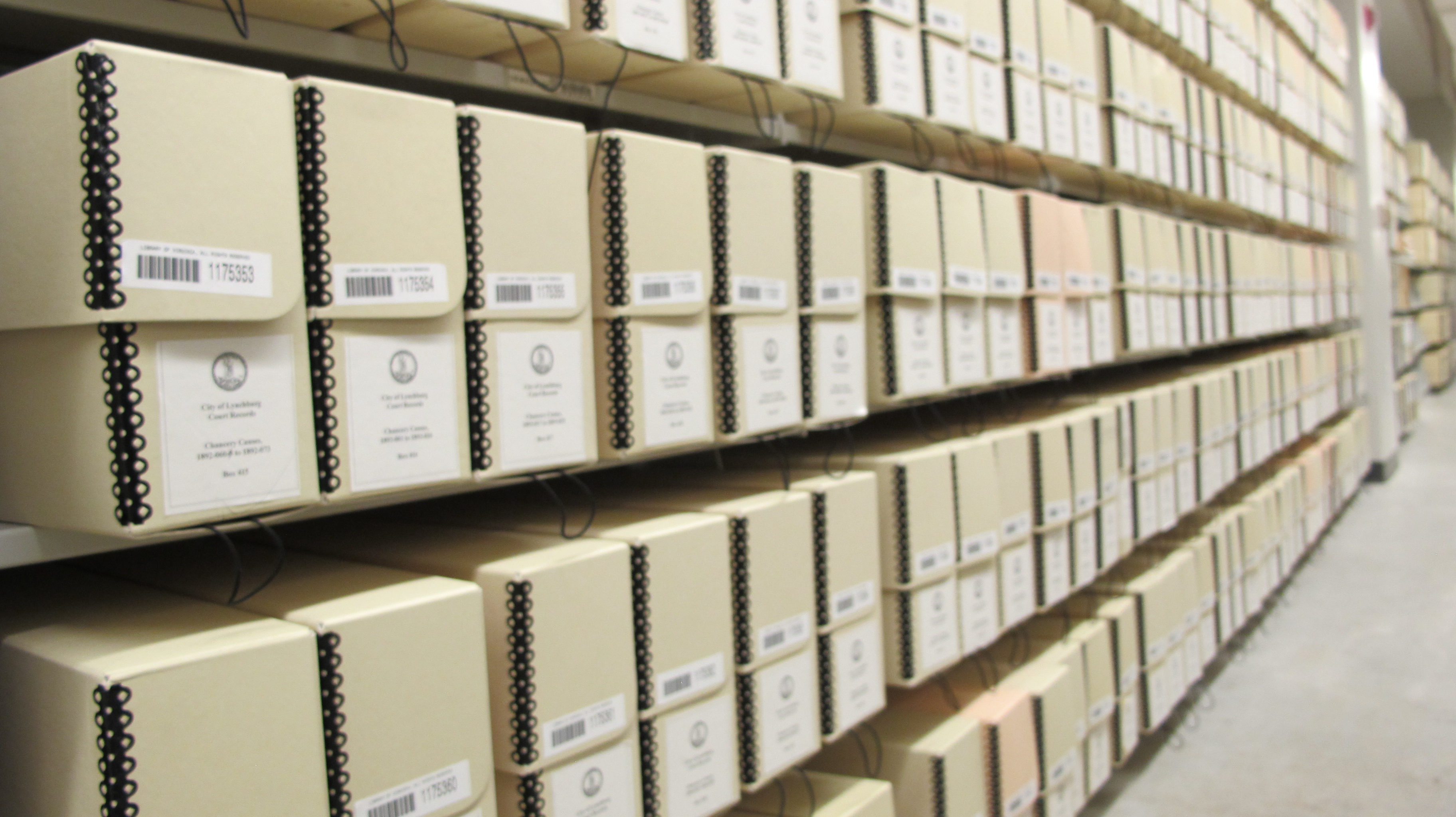2014 has been a special year filled with special events for Stafford County. Celebrating its 350th anniversary, the county held numerous community-based historical celebrations to mark the occasion. On January 4, some 4,300 people kicked off the commemoration with an inaugural event—complete with an interactive history tent and a “live history timeline” enacted by elementary students.
Founders Day festivities, held May 3-4, gathered together 59 groups with 655 participants to showcase different aspects of the county’s history—with a parade, history square, and county-wide school fine arts program. Close to 13,000 people turned out for this unique sesquarcentennial jubilee. The Local Records Services branch of the Library of Virginia was selected to participate and staff a table displaying mounted reproductions of county documents found in its archival collections.
Individuals researching Stafford County history know that it is a locality that has experienced a massive loss of its loose records and volumes. Helping provide a context for earlier surviving documents (see the Lost Localities Digital Collection) as well as adding to the county’s ongoing story, the digital images for the Stafford County (Va.) Chancery Causes, 1866-1912, are now available online through the Chancery Records Index on the Library of Virginia’s Virginia Memory site. Because these documents rely so heavily on the testimony of witnesses, chancery causes contain a wealth of historical and genealogical information and are especially useful when researching local, state, social, or legal history. Chancery causes often contain correspondence, property lists (including slaves), lists of heirs, and vital statistics that are especially helpful in documenting the African American experience, family history, women’s history, and Southern business and labor history. Following are a few suits of interest found in the collection.
One cause, John Taliaferro vs. James W. Tolson, etc., 1872-006, describes earlier events which took place during the county’s most trying time, the Civil War. The defendant, Tolson, had in his possession horses and mules purported to be captured Union stock. He offered to sell them to the plaintiff and another defendant, both of whom were in the Confederate service and could get them through Confederate lines. After Taliaferro and his associate gave their note for the horses, a Confederate quartermaster seized the animals and claimed them to be property of the Army because they bore Army marks. Thus, plaintiff argued, there was no judgment (debt) to be enforced against he or his associate because Tolson never had title to sell the animals in the first place.
Other causes convey in “no uncertain terms” the devastating effects of the Civil War—including the dramas of debt, business dissolutions, and estate disputes. In Exr. of Thomas Towson vs. Edward M. Henry and wife, 1867-005, the plaintiff contended that in April 1862 “soldiers belonging to the United States service broke into your orator’s house & destroyed & carried away many of his valuable papers”—among which was the defendant’s bond dated December 1861. The suit of Henry Moore vs. Withers Waller, 1868-003, describes a fishing operation between plaintiff and defendant which ended due to “hostilities” between the Southern states and the U.S. government. Emily Withers vs. Admr. of Thomas Withers, 1874-007, conveys the personal toll that the war took on these particular residents.
Slavery is a prominent topic in George W. Skinker vs. Charles J. Henry, etc., 1888-002, and Charles Strother, etc. vs. Admr. of John Baalam, etc., 1909-018. The first suit involves a contract dispute over land. The will of Samuel Skinker, dated 1856, is included as an exhibit and contains the names of the slaves that he owned. He wanted one slave named Willie to learn a trade and then be sent to freedom in Liberia when he reached 22 years of age. The second suit shows that John Baalam died without heirs, leaving over 200 acres of land. The plaintiffs were former slaves claiming to be related to Balaam and seeking a portion of his property. Numerous former slaves and descendants of former slaves were deponents in the suit. These individuals offered testimony providing the names of slave ancestors and former slave owners.
Another topic of interest highlights women’s history. Reuben S. Denny vs. Lydia Brown Denny, 1869-008, involves ancestors of modern-day Stafford County historian Jerrilynn Eby MacGregor. The plaintiff sought a divorce from the defendant, maintaining that the defendant became a “decided, earnest and fanatical enthusiast.” According to the plaintiff, Lydia Brown Denny fell prey to one of the prevalent “isms” of the times, probably abolitionism. The plaintiff provided the names of prominent abolitionists such as Wendell Philips and Parker Pillsbury whom his wife invited to their home. He further stated that his wife neglected her household duties and and developed a violent and avowed aversion toward him, leading him to place her in an insane asylum for observation. The couple had married in Connecticut and initially lived in Massachusetts. The defendant filed suit for divorce in Massachusetts—citing adultery and cruelty. Later, she moved to New York, where her mother resided, and the plaintiff left Massachusetts for Virginia after finding work in one of Stafford County’s gold mines.
Other notable topics include historic properties, Oliver Watson and Exx. of Henry Souther, etc. vs. Albert O. Mays, etc. and Oliver Watson and wife, etc., 1897-008; fraternal organizations, J.M. Woodward, etc. and George Dent, etc. vs. C. Howard Harrison, etc., 1911–003; modes of transportation, Trademen’s Trust Co] vs. H.L. Brown, etc.,1910-008; and the importance of mining, Sylvester Gould vs. David Brown, 1883-003.
The Stafford County Chancery Causes, 1866-1912, join the growing list of chancery causes from various localities that have been digitally reformatted and made available through the Library of Virginia’s innovative Circuit Court Records Preservation Program (CCRP), a cooperative program between the Library of Virginia and the Virginia Court Clerks Association (VCCA), which seeks to preserve the historic records found in Virginia’s circuit courts.
–Callie Lou Freed, Local Records Archivist































